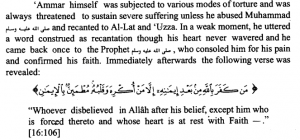بسم الله الرحمن الرحيم
It is a very serious judgement to make, indeed the Prophet ﷺ said :
“إذا قال رجل لأخيه: يا كافر، فقد باء بها أحدهما، فإن كان كما قال وإلا رجعت عليه“
“When a person calls his brother (in Islam) a disbeliever, one of them will certainly deserve the title. If the addressee is so as he has asserted, the disbelief of the man is confirmed, but if it is untrue, then it will revert to him.”1
① Firstly, this kind of judgement is done by ‘ahlul hil wal aqd’ : أهل الحل والعقد, a group of scholars and not by any individual.
② Secondly, we need to highlight and expose the proofs to the person that commits one of the acts that nullifies Islam : this is Iqâmatul Hujjah : إقامة الحجة ; we need to explain him in detail, that according to the Qur’an and the Sunnah, this act takes a person out of boundaries of Islam. We need to make sure that the person didn’t do this act, out of ignorance. For example, the event with the newly converted companions who didn’t know that what they were asking for was a type of shirk (associating partner with Allah) :
عَنْ أَبِي وَاقِدٍ اللَّيْثِيِّ، أَنَّ رَسُولَ اللَّهِ صلى الله عليه وسلم لَمَّا خَرَجَ إِلَى خَيْبَرَ مَرَّ بِشَجَرَةٍ لِلْمُشْرِكِينَ يُقَالُ لَهَا ذَاتُ أَنْوَاطٍ يُعَلِّقُونَ عَلَيْهَا أَسْلِحَتَهُمْ فَقَالُوا يَا رَسُولَ اللَّهِ اجْعَلْ لَنَا ذَاتَ أَنْوَاطٍ كَمَا لَهُمْ ذَاتُ أَنْوَاطٍ . فَقَالَ النَّبِيُّ صلى الله عليه وسلم “ سُبْحَانَ اللَّهِ هَذَا كَمَا قَالَ قَوْمُ مُوسَى : : (اجْعَلْ لَنَا إِلَهًا كَمَا لَهُمْ آلِهَةٌ ) وَالَّذِي نَفْسِي بِيَدِهِ لَتَرْكَبُنَّ سُنَّةَ مَنْ كَانَ قَبْلَكُمْ “
Abu Waqid Al-Laithi narrated that when the Messenger of Allah ﷺ went out to Khaybar he passed a tree that the idolaters called Dhat Anwat upon which they hung their weapons. They (the Companions) said:
“O Messenger of Allah! Make a Dhat Anwat for us as they have a Dhat Anwat.’ The Prophet ﷺ said: “Subhan Allah! This is like what Musa’s people said: Make for us a god like their gods. By the One in Whose is my soul! You shall follow the way of those who were before you.”2
To know more about the nullifiers of Islam, see Nullifiers of Islam of Shaykh Muhammad Ibn Abdul Wahhâb
③ After that, we need to assure that the person has his head straight; that he is not insane or he did not do this act or speech out of emotion:
حَدَّثَنَا أَنَسُ بْنُ مَالِكٍ، – وَهُوَ عَمُّهُ – قَالَ قَالَ رَسُولُ اللَّهِ صلى الله عليه وسلم “ لَلَّهُ أَشَدُّ فَرَحًا بِتَوْبَةِ عَبْدِهِ حِينَ يَتُوبُ إِلَيْهِ مِنْ أَحَدِكُمْ كَانَ عَلَى رَاحِلَتِهِ بِأَرْضِ فَلاَةٍ فَانْفَلَتَتْ مِنْهُ وَعَلَيْهَا طَعَامُهُ وَشَرَابُهُ فَأَيِسَ مِنْهَا فَأَتَى شَجَرَةً فَاضْطَجَعَ فِي ظِلِّهَا قَدْ أَيِسَ مِنْ رَاحِلَتِهِ فَبَيْنَا هُوَ كَذَلِكَ إِذَا هُوَ بِهَا قَائِمَةً عِنْدَهُ فَأَخَذَ بِخِطَامِهَا ثُمَّ قَالَ مِنْ شِدَّةِ الْفَرَحِ اللَّهُمَّ أَنْتَ عَبْدِي وَأَنَا رَبُّكَ . أَخْطَأَ مِنْ شِدَّةِ الْفَرَحِ “
Anas b. Malik رضي الله عنه reported that Allah’s Messenger ﷺ said:
Allah is more pleased with the repentance of a servant as he turns towards Him for repentance than this that one amongst you is upon the camel in a waterless desert and there is upon (that camel) his provision of food and drink also and it is lost by him, and he having lost all hope (to get tat) lies down in the shadow and is disappointed about his camel and there he finds that camel standing before him. He takes hold of his nosestring and then out of boundless joy says: O Lord, Thou art my servant and I am Thine Lord. He commits this mistake out of extreme delight.3
④ Then, we need to verify that the person did this act from his will and not forced or threatened by someone or under duress, like Ammâr ibn Yâsir رضي الله عنهما :

[Raheeq al Makhtum p.97 : Persecutions]
⑤ Finally, we must clear any kind of doubts (shubuhaat) or misinterpretation (ta’weel) and make sure that the person didn’t misunderstand something from the religion of Islam. For instance, this event with Khâlid Ibn Al Walid رضي الله عنه :
عَنْ سَالِمٍ، عَنْ أَبِيهِ، قَالَ بَعَثَ النَّبِيُّ صلى الله عليه وسلم خَالِدَ بْنَ الْوَلِيدِ إِلَى بَنِي جَذِيمَةَ، فَدَعَاهُمْ إِلَى الإِسْلاَمِ فَلَمْ يُحْسِنُوا أَنْ يَقُولُوا أَسْلَمْنَا. فَجَعَلُوا يَقُولُونَ صَبَأْنَا، صَبَأْنَا. فَجَعَلَ خَالِدٌ يَقْتُلُ مِنْهُمْ وَيَأْسِرُ، وَدَفَعَ إِلَى كُلِّ رَجُلٍ مِنَّا أَسِيرَهُ، حَتَّى إِذَا كَانَ يَوْمٌ أَمَرَ خَالِدٌ أَنْ يَقْتُلَ كُلُّ رَجُلٍ مِنَّا أَسِيرَهُ فَقُلْتُ وَاللَّهِ لاَ أَقْتُلُ أَسِيرِي، وَلاَ يَقْتُلُ رَجُلٌ مِنْ أَصْحَابِي أَسِيرَهُ، حَتَّى قَدِمْنَا عَلَى النَّبِيِّ صلى الله عليه وسلم فَذَكَرْنَاهُ، فَرَفَعَ النَّبِيُّ صلى الله عليه وسلم يَدَهُ فَقَالَ “ اللَّهُمَّ إِنِّي أَبْرَأُ إِلَيْكَ مِمَّا صَنَعَ خَالِدٌ “. مَرَّتَيْنِ.
Narrated Salim’s father:
The Prophet ﷺ sent Khalid bin Al-Walid to the tribe of Jadhima and Khalid invited them to Islam but they could not express themselves by saying, “Aslamna (i.e. we have embraced Islam),” but they started saying “Saba’na! Saba’na (i.e. we have come out of one religion to another).” Khalid kept on killing (some of) them and taking (some of) them as captives and gave every one of us his captive. When there came the day then Khalid ordered that each man (i.e. Muslim soldier) should kill his captive, I said, “By Allah, I will not kill my captive, and none of my companions will kill his captive.” When we reached the Prophet, we mentioned to him the whole story. On that, the Prophet ﷺ raised both his hands and said twice, “O Allah! I am free from what Khalid has done.”4
To sum up, the statement of takfeer (saying that a muslim is a kâfir, disbeliever) is a dangerous one, and can not by made by any individual, rather by a group of scholar who will study this particular case with that person and verify that all the conditions above are fulfilled.
However, it doesn’t mean that we can’t judge an act that a person commits and that we can not speak in general, for example, saying that the one who calls upon other than Allah is a disbeliever. The scholars of Islam have detailed the types of sins, from the minor sins, major sins, innovations…etc to the sins that can take a person out of Islam. Therefore, we can judge the act of a person, to be an act of kufr (disbelief) or shirk (associating partner with Allah), but it does not render automatically that person who is doing this act, to be a disbeliever.
والله تعالى أعلم
